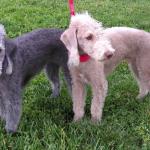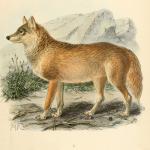We dog owners do many things to keep our canine companions happy and healthy. I flew from San Francisco to Albuquerque last July to pick up a four-month-old Bedlington terrier and have seldom been separated from her since.
dogs
Dogs can sniff out all sorts of things, as every dog owner knows. At the dog park, Cracker, my Bedlington Terrier, unfailingly finds all the dog owners who have treats in their pockets.
Two days before Christmas, I found myself part of a story of the sort that used to be presented on the Hallmark Hall of Fame – sentimental, saccharine, touching, and perfect for the holidays.
As we mature through infancy, adolescence, adulthood, and our "senior" years, our bodies go through many changes.
When your dog looks longingly at you as you eat breakfast, out of compassion and sympathy, do you ever find yourself pouring some orange juice into his bowl? Of course not. You might get bitten. Or, at the very least, you'll get a puzzled look.
Why have we evolved such a close relationship with dogs? Scientists suggest two entangled themes. Dogs have both an uncanny skillset in communicating with humans and a social structure that echoes our own.
By Rachel Allavena, Associate Professor, The University of Queensland
###
A recent study in the Journal of Experimental Biology looked at food choices by dogs and cats [1] when foods were equally palatable, a term we will return to momentarily.
It's difficult to imagine what life must be like for people who work in public relations at United Airlines.
Genetic diversity or lack thereof can have real consequences for our diets, and more importantly, for our health.












